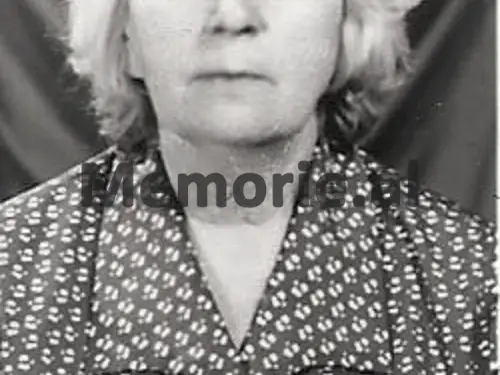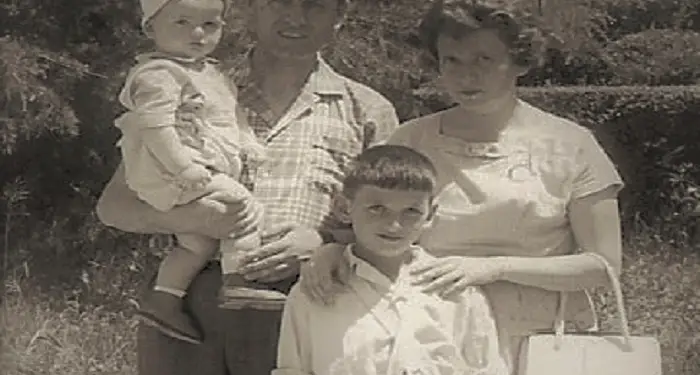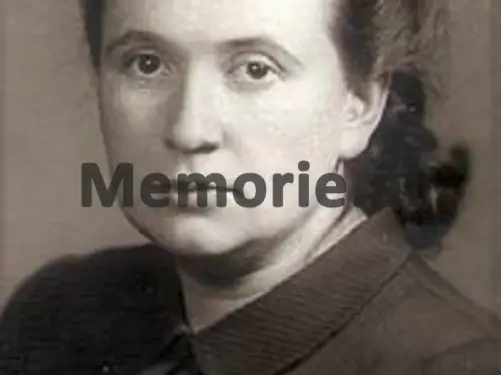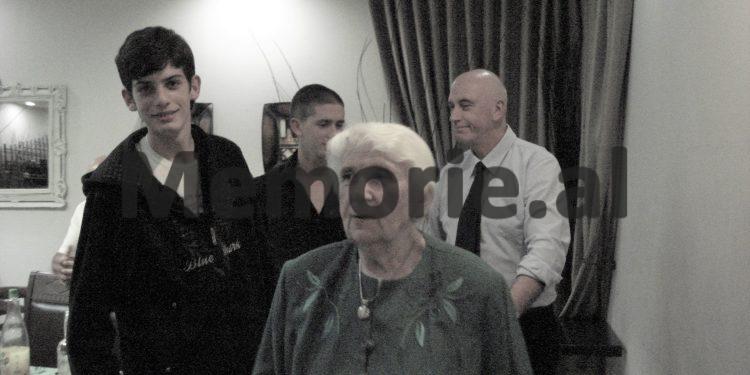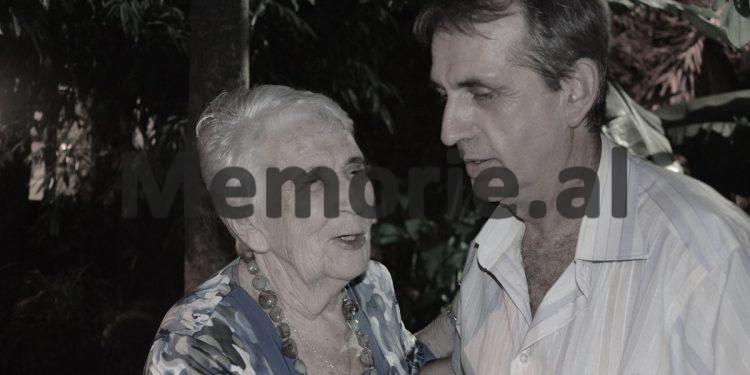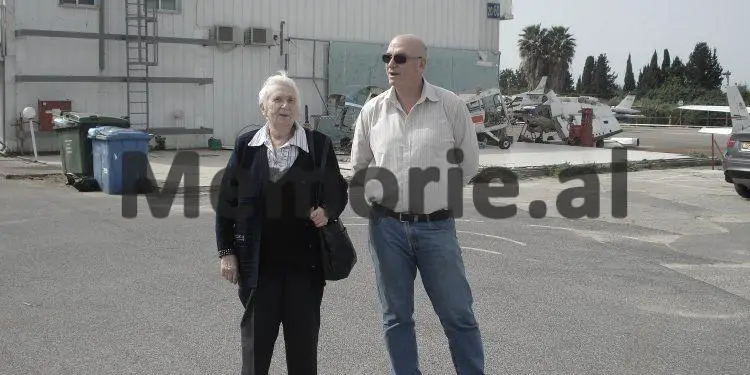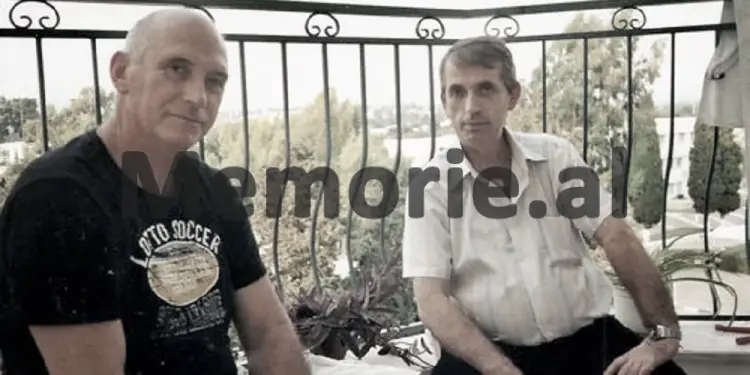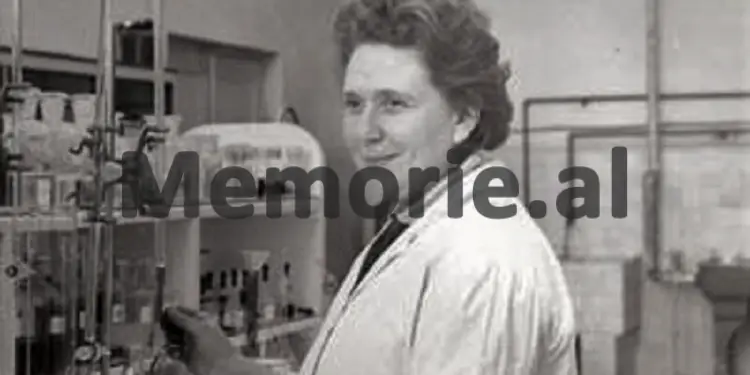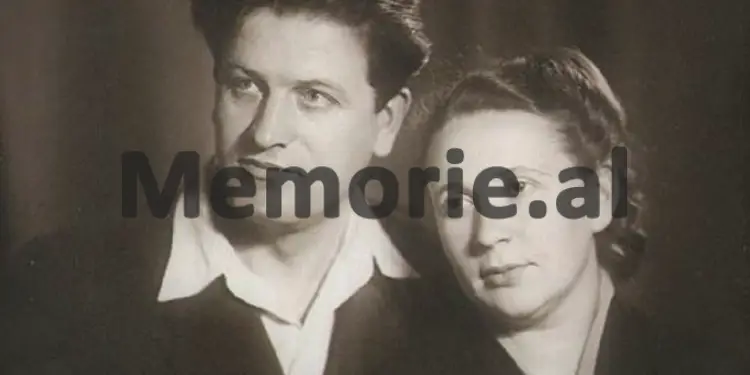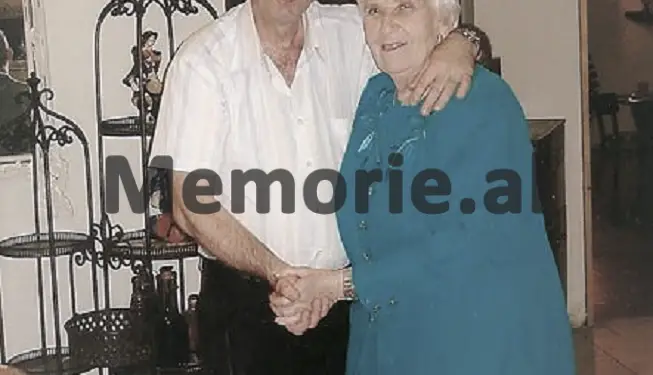By Taisa Batkina Pine
Part thirteen
Memorie.al/publikon the unknown story of the Russian Taisa Batkina (Pine), originally from Tula, Russia, the third child of a very poor rural family, who was left an orphan at a very young age, after her father lost her life while working in one of the coal galleries on the outskirts of Tula, where he worked as a miner (shortly after escaping arrest, accused of “supporting the enemies of the people”) and she grew up with difficulty great economic, as their city continued to be under the bombardment of German forces, which had reached as far as near Kursk. Taisa graduated from the Faculty of Chemistry, near the ‘Lomonosov’ University of Moscow, where she met and married the Albanian student, Gaqo Pisha, originally from the city of Korça, who at that time was studying at the Faculty of Philosophy in Moscow and both together in 1957, they returned to Albania, together with their newborn son, Sasha, and began life in the city of Tirana, where Taisa was appointed as a professor of Chemistry at the State University of Tirana, while Gaqo, in the chair of Marxism- where they worked until 1976, when the State Security arrested Taisa Batkina on fabricated charges, accusing her of being a “Soviet KGB agent” and sentencing her to 16 years in political prison, which she suffered. in the “Women’s Prison” in the city “Stalin”, from where she was released in 1986, while her husband, Gaqo Pisha, had died in 1983, from a serious illness. The tragic story of Taisa Batkina (Pine), in the inhuman camps and prisons of Enver Hoxha’s communist regime, where she spent a decade of her life, along with many compatriots from the former Soviet Union, or other Eastern European countries, comes through her memories, published in a book entitled “We hoped and survived”, memories which, her son, Aleksandër Pisha, kindly offered her for publication, in Memorie.al
We hoped and survived
I dedicate it to the bright memory of my husband, GAQO PISHA
This is a book of memories. In it I want to tell about my life and that of my friends, Soviet women, who tried prison for several years just because they got the courage and got married and linked their fate with that of Albanian students. The prison was part of the great GULAG in the small Balkan country, Albania, where for many years the bloody communist regime of Enver Hoxha ruled, who was a loyal student of Stalin and a follower of his cause.
Through this book I would like everyone to learn about the inhuman trials we experienced and the horrible years we spent in Albanian prisons, just because we… fell in love! And let no one ever forgets what totalitarianism, despotism is and what the consequences of this system are.
Continued from the previous issue
In the prison hospital in Tirana
It was a miracle. It was a life I had not had in a few months. And it seemed to me that everything was happening to me, it was a bad, scary dream that lo and behold, I would wake up, the door would open and I would go home. My house was very close to the hospital, only 10 minutes’ walk. I would go in and see all my loved ones. But suddenly the sound of the door latches and the key was heard, and the dream was shattered. As I stood by the window, I remembered Yaroshenko’s painting “Everywhere I Live,” the resemblance being colossal. I rejoiced in every young shoot, every insect. But this happiness lasted only a week and it all started from scratch; cell, investigators, torture…! In early 1983, I begged the camp doctor to take me to the hospital. I was infected with fungi (a type of fungal infection), fingernails and toenails. It was not a serious disease, it was shaved with such nails, especially since in Albania there was no medicine against nail fungus, and they simply treated it: they removed the infected nail and the pit that formed and painted it with iodine. But I wanted to be hospitalized. I was hoping to meet the man there. He was ill, could not come to the camp to see me, could hardly walk and, of course, could not walk 20 kilometers. They could not take a taxi; they did not have that much money. We had 6 years without being seen. I hoped he could come to the hospital; the house was not far away. And so it.… But let’s move on.
I managed to convince the doctor, she gave me the recommendation. But we waited a long time for the hospitalization. I wrote a letter to those at home saying that I was hoping to be admitted to the prison hospital and that I would write to them again when I arrived in Tirana. Letters were the only means of communication. I was finally told they would send me to the hospital the next day. They started me with “GAZ”. We stared thirstily out of the car windows. In the camp, in the prison, it seems as if life has stopped, as if there is nothing in the world but the prison, and here people were walking, children were running, playing, shouting. I could not take my eyes off them. On the way we stopped to rest in a small town. They allowed us to get out of the car and stand nearby, without a guard. The illusion of freedom! Even though we were dressed in ordinary, non-prison clothes, passersby turned their heads and looked at us in amazement. Apparently, several years in prison had left their mark on us, so we looked strange. In the prison hospital it was the same calm, soft and clean bed, normal food. When I was first hospitalized, at the time of the investigation, I was not given a pencil, a piece of paper, or a newspaper. And this time every day they brought me the daily newspaper. I read it all, from beginning to end. It was the only source of information, albeit extremely poor, but where could I learn what was going on in the world, sometimes reading between the lines. At first I was in a room with Barbara, a Hungarian, an unfortunate, sick woman from our corps, also accused of espionage. (I will write in more detail about her fate in the next chapter). Barbara told me a lot about Hungary. And he sang. He had a beautiful voice and I occasionally asked him to sing me a song.
One day the door of the room opened wide and the nurse entered with her lips on the gas: “Barbara, – he said, – the tests were negative”! And it turned out. Barbara rejoiced and shed tears. They have been treating her for skin cancer for years, and now negative tests! Barbara had beaten cancer. I knew that plucking my nails under local anesthesia was a difficult procedure, but I had no choice but to see my sick husband. In the mailbox, which was located in the corridor of the hospital, I threw a postcard for home, where I wrote that I was in the hospital, in Tirana and I was waiting for the meeting. But before I could meet (I later found out that the postcard had been stuck in the mailbox for more than two weeks), they took me to the operating room, put me on the table. The anesthesia was just ether, with which he smeared my fingers, so that it almost did not remove the pain at all. But I gritted my teeth and endured the operation, without making a sound. They pulled out my two fingernails, but when they removed one of my fingernails, I lost consciousness. With that nail biting ended, the doctors brought me in and took me to the room. Barbara was soon sent back to camp, and I was left alone. So I spent a month and a half in the hospital. My loneliness broke down several times a day. In the morning the usual visit of the doctor, then came the treatment nurse, who 2-3 times a day smeared my wounds with iodine, then the distribution of food. The regime was like a prison, locked door and barred and mesh windows. But I was fired, from work, from the terrible noise of the camp, from the common sleep, from the constant presence of strangers. At first I could not walk, I lay down all day, my fingers hurt a lot and I was bleeding.
But all this was nothing, compared to the joyful reception of the meeting. But no one was coming from the house yet and I started to worry. There were many reasons to worry. The situation in the country was such that you could expect new persecutions at any time, but my husband’s health condition was also serious. Finally the door of my room opened at an unusual time and the guard escorted me to the meeting. I could hardly walk, but I tried my best not to limp, to walk in such a way that my people would not be noticed. Meetings were held in the courtyard, near the gate. I went out into the sunlit yard and near the bars my husband, eldest son, Sasha and Alma, our niece, caught my eye. I was terrified. Gaqoja, my husband, once tall, handsome, powerful, had become a poor old man when he was not even 63 years old. But I had to restrain myself, pretending that everything was going well. We stood by the handcuffs and cried. I remember he asked me if my fingers hurt. The kids said something, asked, I answered like through smoke. 15 minutes passed quickly, like a dream and they took me. After two weeks they came to the meeting again… everything was repeated, we could not talk this time either. Gaqoja was crying I could hardly hold back my tears, I was smiling; I was pretending that everything was going for beauty. Kostya was a soldier at the time and when he came with permission, he was not allowed to meet with me. “Not allowed! Only one meeting in two weeks”! They did not accept his prayers or the excuse that he was a soldier and had come for a few days from afar…! When my people came again after two weeks, the meeting did not take place… I was taken from the hospital and taken to the camp. These meetings took place in April 1983; then I saw my husband for the last time. He was no more in July. (How I got this news, I will show below). In those days, when I was hospitalized in the prison hospital room, where I had no one to exchange two words with and I had a lot of free time, I had to invent something, to distract myself from the thoughts that did not leave me, that what would be done next, from thoughts about the family, about the sick husband, and about the boys.
As I thought about all this, I felt like I was going crazy. And I started inventing all sorts of fantastic stories, oral stories. Hand in hand these stories became very much and turned into the whole novel. When I plunged into this imaginary world, as if I did not meet, I went out of reality, invented incredible adventures and situations, in which my heroine was: kidnappings, hostages, escapes, love and much more. Together with my heroine I experienced her life, an easy, fabulous life, very distant from mine. I lay in bed, made up stories, slept, woke up and met my heroine again. This work lasted for hours. When the door opened, I did not want to meet anyone, to talk to anyone, I wanted to be alone again and as soon as possible, to immerse myself in my fantasies. The nurse, who was treating me, was amazed at how calm and wise I was, I did not ask for anything, I did not knock on the door, I looked more than satisfied. While I rested with the soul, the nervous system seemed to be renewing, the organism defended itself. When I returned to camp, I told Nadja about my “novel”. Nadje also liked to create; she often showed us all versions of her creations. She liked my fantasies, we made up together for a few days, then everything was forgotten… work, prison conditions… there was no time for creativity! I remember this “deed” now and I think that it was nothing but a vain whim without meaning! In the evening, when the staff finished work and sat in the kitchen, at the end of the corridor, we started communicating with each other through the windows. We exchanged the latest news in the camp, the news outside, in freedom or just muttering, tortured by prison loneliness.
The windows of my room overlooked the courtyard, opposite was a building. At first we did not know what was there. Then, when Barbara sang to her in the evening, we heard enthusiastic shouts from there: “Bis! Bis! ” We realized that there was the men’s ward. During the day we did not see anything, and in the evening, after the lights were turned on, we started to see silhouettes. The young girls said that their faces were also visible, although there were bars and dense nets in the windows. In the evenings we also talked to the prisoners of the other corps. I remember a young boy… I’m sorry, but I did not learn his name. His story was typical of that time. He was about 25 years old, maybe a little older. His father, who held an important post, was arrested in the ’70s, in the years of great terror. The family was deported, and then their son was also arrested. The boy worked in the chrome mine in Spaç, where there was a large men’s camp. In the mines where the prisoners worked, accidents occurred almost every day. One day the boy fell under the decovil wagon and as the neighbors of the room said, was badly damaged. I liked the unusual sharpness of his words: “Behold, I am learning to walk on crutches, these days my mother will come to see me. I do not want to scare him, so do not take me out in a wheelchair! I want to go out on my own! With crutches, but myself… ”! He told us that he liked to draw and that he was sorry that he could not deal with this passion. I asked him about the fate of some of my acquaintances. From him I received the sad news that Ismaili had been retried and sentenced to another 10 years, for agitation and propaganda. “Ismaili,” my interlocutor told me, “did not speak at all, but even that did not save him.” The Albanian Security Bodies did not easily let go of their victims.
The shooters
In the camp and in the hospital there were frequent shootings, simulants. One evening, while I was in the hospital, I heard someone calling to me. I answered. It was the neighbor, a girl, whom I had known in the camp. She told me that Day was in the room with her, which… is crazy. Shut up, do not talk to anyone, and do not know anyone. I knew the day well; was a young girl, convicted of a trivial mistake. She was a cheerful girl, noisy… and unexpected…! I tried to talk to him from the window, from the door. She did not answer. I was told that this is how he has been behaving for several weeks. One day we met in the hallway, she did not react at all. They were taking us to the graph, I was sitting next to her and, without noticing, I shook her hand. She shivered, but did not recover. They visited him carefully, treated him, but to no avail. They prepared to bring him to the commission and release him. But just a few days before she was brought before the commission, she could not bear it. He lost control and doctors were able to prove that the girl had been pretending to be insane for 6 months. He sent him back to camp, and his sentence was increased. Our camp doctor, a young girl, was good, inexperienced, and often did not understand shooters. The prisoners eagerly awaited her arrival. Many of them came to visit, especially young girls, who were looking to get fired or even take a day off. Many of them were allowed by the doctor to stay in the camp. There were some really sick too, but most pretended.
They simulated madness, artificially raised the temperature, rubbed their hands with herbs, which provoked skin irritation, swallowed nails, pins…! They sent them to the hospital, treated them, and when they returned to the camp, they put them in the dungeon. But after a while they swallowed the nail again. A young bride lost her hand and could not work. They cured him for a long time, but without success. But one day the nurse forced her to undress and noticed that she had the ligament tightly tied under her armpit with a piece of elastic. Or… one day I noticed in horror how a young girl lit a plastic bag and stood still as the plastic mass flowed through her legs, where a scary wound formed. She stayed almost two months without work. There have also been suicide attempts. The girls quarreled among themselves and ran to jump from the third floor. (Fortunately, there were no casualties). One, while flying down, was caught behind the balcony of the second floor; another broke both ankles, stood in the dungeon with his feet in plaster and was very pleased that he should not work. I was always amazed by them; young, strong girls, work were not a problem for them, they fulfilled the norm as if playing, work for them was fun, but here they had such a mentality: it was better to sit down than to go to work.
The struggle for liberation
A year and a half of investigation, loneliness, moral and physical torture, unfair trial an turned me into a man with a completely paralyzed will. I lost the ability to think and reason. Of all the feelings, only fear remained. When they took me to the camp, I found other unfortunate ones like myself and slowly I started to calmly evaluate everything that happened to me, everything the insurance companies did with me and my friends. After nearly a year I started the fight for the removal of the unjust charge, for rehabilitation and release from prison. I started writing letters. I sent a letter to the Supreme Court, to the General Prosecutor’s Office, to the Ministry of Internal Affairs. Others also wrote. We could not write collective letters, they considered them as a conspiracy, for which they could retry you and increase the sentence. After my first letter (I do not remember now, where I sent it), came my investigators and some cadres of the M.P.B. of Albania. I was called to command. They started shouting at me, threatening me, hitting the table with their fists and measuring them to hit me. But now I was no longer afraid. I knew it was belated courage. But I felt relieved because I went to war. I knew full well that no one would ever take the matter to the second investigation. Our investigators and prosecutors felt happy that they could intimidate us, deceive us and break us, force us to sign white papers and fabricate a lawsuit, to try and convict us. Could they admit their mistakes? On the other hand, all this was done with the blessing of those… above. They kept me in the room for two hours and asked me to deny everything I had written on the paper. I do not know why they needed this, because the replies they sent were copies of each other. Even that first time, after my letter, after almost two months, I received a response with approximately the following content: “Your case has been verified, you have been rightly convicted.”The issue cannot be reviewed.”
After six months we wrote again, mentioned new arguments and facts, but always got the same answer. Usually the commissar would call us and say: “Here is the answer, read”! I read it, the commissioner asked me to sign, he got the answer again and what he was muttering to himself. It seems to me that he was saying that our judicial system is better, fairer, etc. He demanded that we stop writing, that we do not disturb our leaders. But we did not stop writing. The three of us, the “espionage group”, were in agreement: we must write, we must fight. We were no longer afraid. Time is running out. The class struggle beyond the camp boundaries expanded and intensified. At the end of 1981, Enver Hoxha killed his closest and most loyal comrade-in-arms, with whom he had started working since the years of the National Liberation War, Mehmet Shehu. The official version was je suicide! I know nothing about others, but I did not believe this version from the beginning. Mehmet Shehu was a man of authority, savage, ruthless and of character, who would never allow himself to commit suicide. After his death, new persecutions, arrests and shootings began. Among many others was shot a doctor, excellent surgeon. He was the Minister of Health at the time and, as it was later learned, had been the first doctor to see Mehmet after his death. He knew many things, so he was shot. Shortly afterwards, Mehmet Shehu was declared a “polyagent,” a spy for the Soviets, Anglo-Americans, and Yugoslavs. The tragedy of the “class war” and the persecution, among the main organizers of which was Mehmet Shehu, fell on his own head. Then they declared the Minister of Interior, Kadri Hazbiu, an enemy of the people. They killed him too.
The first amnesty
In our conditions it is difficult to think about amnesty. But since the summer of 1982, words of apology have been heard again. Here I would like to quote: “There is another truth; here you cannot, but do not get caught up in rumors of amnesties, changes, honest prosecutors to come, to reconsider the issues without prejudice, if you do not steer your fragile boat with course once towards a hope “times to another, in such a way that you always see before the hopeful light of a lighthouse”. (Oleg Valkovi, “Diving in the Dark”, Moscow 1989, p. 261). It had been 20 years since the last amnesty. The closer November got, the more words of amnesty were heard. November in Albania is the month of holidays: the day of the founding of the Communist Party, the day of the declaration of Independence and the Day of Liberation from the German occupiers. Usually amnesties in Albania are made on the eve of the holidays. The words became more and more insistent, and then were reinforced even with the data coming from the command. Those who worked in the command spoke very confidently of a speedy amnesty. They wrote about this in the letters, they talked in the meetings. Our hope, that everything would end, the bad dream would end and we would get out very quickly beyond the fence of barbed wire, as it got stronger. Somewhere between November 20-25, the decree on amnesty was published. /Memorie.al




